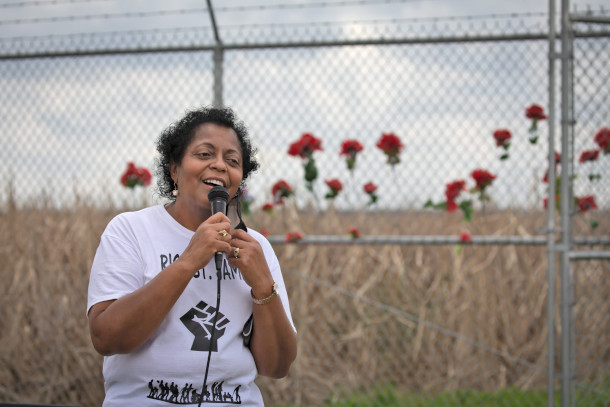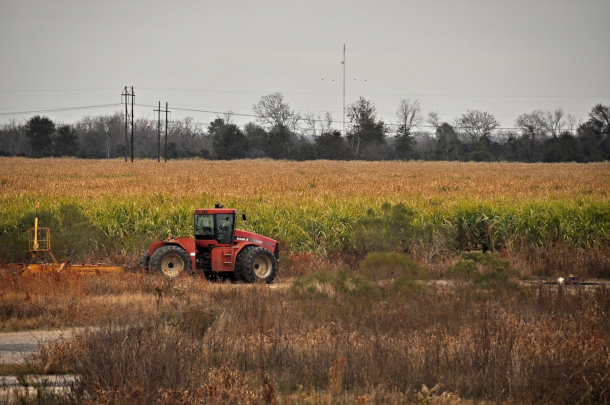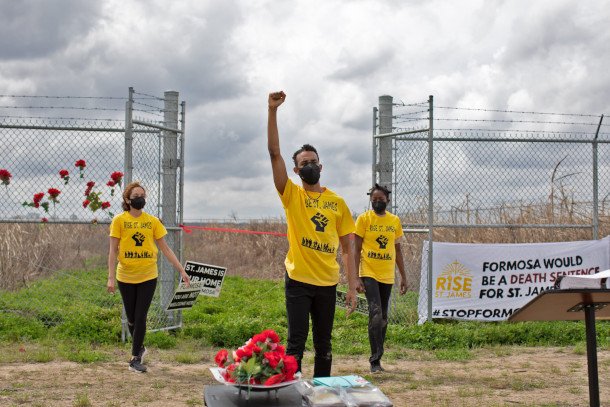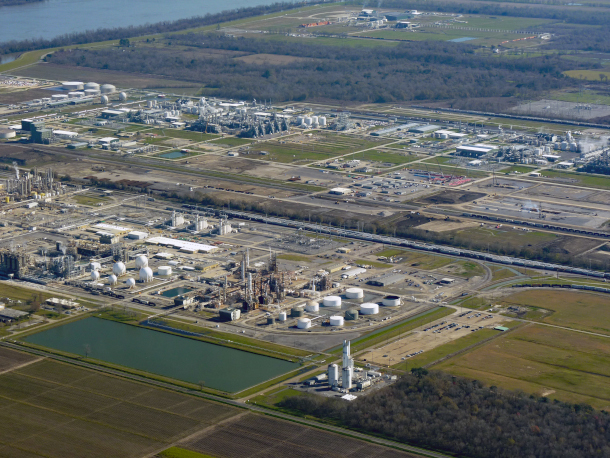Black History on the Mississippi
Air Date: Week of February 18, 2022

Founder of RISE St. James and 2021 Goldman Environmental Prize winner Sharon Lavigne speaks at the first annual African American Celebration at the gravesite of enslaved ancestors at the Buena Vista Cemetery. The land was purchased by Formosa for a proposed petrochemical complex. (Photo: Goldman Environmental Prize)
After 1865 Black Americans freed from the sugar plantations of slavery rose up and built thriving communities in the deep rich bottom land along the Mississippi River between Baton Rouge and New Orleans. But a century later, the petrochemical industry moved in and now more than 150 facilities pollute the air, land, and water in what’s been dubbed Cancer Alley. Sharon Lavigne, the founder of environmental justice group RISE St. James, joins Host Steve Curwood to share her memories of what her home was like before industrial poisoning, and to talk about the ongoing struggle to protect its residents.
Transcript
BASCOMB: It’s Living on Earth, I’m Bobby Bascomb
CURWOOD: And I’m Steve Curwood
As part of black history month we’re going consider the story of people who came up from the sugar plantations of slavery and built thriving communities but then became bound by deadly pollution a century later. An 85 mile stretch along the Mississippi River between Baton Rouge and New Orleans has been dubbed Cancer Alley, thanks to the petrochemical industry that began building there in the 1960’s. Today over 150 petrochemical facilities pollute the region’s air, land and water, leading to high rates of cancer, respiratory illness, and mental health challenges. Sharon Lavigne lives on land bought by her grandfather in St James Parish Louisiana and when she saw her friends and neighbors getting sick and dying she retired as a special education teacher to devote herself full time to anti-pollution advocacy. She founded RISE Saint James, an environmental justice group working to stop more toxic chemical plants from moving into her community. Her organization and others sued Formosa, a Taiwanese company that wants to build an ethane cracking plant for producing plastic nearby. The litigation prompted the Army Corps of Engineers and the courts to halt construction and require an updated environmental impact statement of the proposed facility. For her work Sharon Lavigne was awarded the 2021 Goldman Environmental Prize for North America and she joins me now. Welcome back to Living on Earth Sharon!
LAVIGNE: Thank you for having me.
CURWOOD: So Sharon, how are you doing? Last time we talked, it was right after Hurricane Ida had struck your neighborhood and the surrounding region?
LAVIGNE: Well, I'm doing a little bit better because I'm living in a travel trailer at night and in the morning, I come in my home to sit by my kitchen table to get on my laptop. So that's a little bit better. And the roof on my house is completed. Now we trying to find a contractor to do the inside of the house.
CURWOOD: Oh my goodness, trying to find a contractor is like trying to find a pot of gold at the end of the rainbow I think.
LAVIGNE: That's right. It's hard to find a contractor at this time because so many homes were destroyed. So it's hard to find one.
Indeed they are: Louisiana Chemical Plants Are Thriving Off of Slavery - The Atlantic @theccr @risestjames @labucketbrigade https://t.co/yIpOG6QYPh
— Pam Spees (@PamSpees) May 7, 2021
CURWOOD: So you've lived in the St. James Parish, what your whole life and generations before you? What was it like there as a kid?
LAVIGNE: Oh, in St. James, it was wonderful. It was living the American dream because at that time, we had clean water, we had clean air, we plant gardens, the trees had pecans, plum trees, persimmon trees, orange trees, lemon trees. We had everything. We had gardens, we had our livestock, we didn't have to buy any meats from the store. My daddy would kill hogs, chickens, cows. And it was about the life of Riley, it was so wonderful back then.
CURWOOD: And today, what are things like there?
LAVIGNE: Today, it's like living almost in a cesspool, close to it. We have chemical industry that came in, in the late 60s and after that more and more started to come and with all of these combined it made the pollution so powerful. It made it where whenever we walk outside you could smell a foul odor and we can't drink the water anymore because the water is polluted, and we can't do a productive garden anymore because the soil is polluted. So it's a whole different world now. We trying to live in this filth but not knowing at the time when it first came in it would be like this. Everybody thought it was wonderful that industry came in but now it's not wonderful.
CURWOOD: That's right, when when you're were young, St. James Parish is right along the Mississippi there so there's really rich bottom land that you could grow anything inn, right?
LAVIGNE: It was at one time it was, yes.
CURWOOD: And people used to grow sugar cane in that region?
LAVIGNE: That's right, we still do. But a lot of the industries bought out the sugarcane farmers land. And now we have the industry in place of the sugar cane in some of the areas.
CURWOOD: Now your family participated in the civil rights movement in your your father did do some sugarcane farming. Tell me about that history.
LAVIGNE: Well, as long as I can remember, we had sugarcane. My daddy harvested the sugarcane. And back in the 60s, when he tried to integrate the school in St. James on the West Bank that's when the local factories stopped taking his sugarcane because of the work he was doing. So you have to go to another parish to have them to pick up his sugar cane. The local people they denied him, they denied his sugar cane, his business.
CURWOOD: Because he was doing civil rights actions?
LAVIGNE: Action. That's right. That's right.

A tractor in a sugarcane field in Louisiana. (Photo: Faungg, Flickr, CC BY-ND 2.0)
CURWOOD: Now you received an award for fighting against the plants there in your neighborhood. There was a big plastics plant by Formosa. There was another one that's proposed. So far what are the results of your opposition to these plants?
LAVIGNE: Well Formosa, it's on hold right now. The Army Corps of Engineer has to do a complete EIS, environmental impact statement and that's going to take about a year or two. So that's the hold up right now. But the word that I heard is, they are trying to go to another parish. And I also heard that they are going to buy land from another industry that's in Plaquemien and tag along next to that industry. That same industry that they're going to tag along to, that industry tried to come in Convent, Louisiana, back in the 1990s and 80s and the people ran them away. I was a little girl back then and my dad and my cousin Emelda West, they would talk about it in the kitchen when I would pass through the kitchen and they would talk about how this plant wants to come into Convent. And cause an email to said she's not going to let it come and it didn't come and she fought against that.
CURWOOD: And Convent Louisiana is in which parish?
LAVIGNE: It's in St. James, but it's on the East Bank.
CURWOOD: So your activism along with so many other people in the in the communities along cancer alley, certainly it doesn't go unnoticed. But it's a huge fight. I mean, these are multi billion dollar corporations that spew these toxic contaminants and they are allowed to exist so close to the homes of all these people. What inspires you to keep going? Why is this important?
LAVIGNE: It's important because if we don't fight, we will die. This place is so polluted and so many people have cancer, so many people have already died from cancer, so if we don't fight to keep it away from here, we will die. That's the bottom line- there's no ifs, ands or buts. We will die, because we already have twelve in a 10 mile radius in the 5th district. We had nine in the fourth district. I think we have seven now. And we have a grand total of data that shoots across the river straight to my house. And one of the plants have particulate matter (PM) 2.5. I didn't even know anything about that until after I started doing this work. But look how many years I passed by that plant and they're polluting us. So whatever is in my body is coming from these industries over a period of time. It just didn't happen overnight. So if Formosa comes in here, we will not live because they will triple the emissions in the fifth district and it will double throughout the parish. And I live two miles from where this plant wants to be built, only two miles. And the church is one mile and a school is one mile. So no, St. James, 5th district is full and we can't take anymore.
CURWOOD: As I understand it, there was an old cemetery an old slave cemetery.
LAVIGNE: Yes, yes, it's there. And one thing I didn't like about Formosa, we had to bring it to the parish council about the grave site, they kept it a secret for 17 months. Then when we found out about it we brought it to the parish council, they didn't do anything about it, he didn't even care it looked like. They didn't care that we found a gravesite or if they desecrate the grave. They didn't even respond to us. So we stopped that, because they were going to build that plant on top of the grave sites. But we expose them, so they're not gonna build at all. But that's our ancestors in those graves and it's more than one great site. And we went out there, and we had an action and we did a Juneteenth out there and we did a celebration with the Bishop of Baton Rouge for All Saints. And we did a black history program out there. And trust me, you can feel the presence of our ancestors. It's like they were rejoicing that we didn't forget about them. I felt it. I don't know about other people but it looked like they were so glad that we were out there at the site rejoicing. And I don't know what other people but I felt the spirit, I really did. And it made me so happy. I wanted to cry, I felt so good. It was just that powerful.
CURWOOD: To what extent are they guiding you now?
LAVIGNE: The ancestors?
CURWOOD: Yeah.

Community members at RISE St. James’ first annual African American Celebration at the Buena Vista Cemetery, the gravesite of enslaved ancestors. (Photo: Goldman Environmental Prize)
LAVIGNE: Oh, their spirit, they’re telling me to fight. They are telling me to fight and you know what I want to do? I want RISE to get some funding so we can buy the land and preserve those grave sites. And they’re going to be even more happy when they know we care about them. Because you see they don't have a headstone or anything, they just have markers. The archaeologists showed us the markers and we can put some kind of symbol or something there, you know, to let everybody know that that's the gravesites of our ancestors. So that's what I would like to do.
CURWOOD: Now, during the recent presidential campaign, President Biden came to this part of the Lower Mississippi. It's called cancer alley because of what there's more than 100 petrochemical plants, between Baton Rouge and New Orleans. Right. And President Biden promised to put environmental justice at the center of his mandate. So what have you seen in the way of any changes so far in the community when it comes to addressing all that overwhelming chemical pollution from those plants?
LAVIGNE: I don't see hardly any improvement from the time he ran for office until now. That was why we had a meeting with the White House last week. Because we talked to them, to ask them why is he leaving us out. Because he campaigned in about cancer alley. He campaigned about a whole lot of things about the environment and he's not helping us. He keeping promises but other things that he said but he's not keeping his promise with us with cancer alley and specially with St. James Parish, because he mentioned St. James Parish in this campaign, and he haven’t come back to see about us. He haven't reached out to us. I know he's busy with COVID and other things, but I don't think he should put us on the back burner. I think he should let us see something. The EPA said they was gonna put some monitors in the area, you know some air monitors. So that's in the making right now. But we don't see them putting a halt to our deaths over here in cancer alley. That's what we don't see. We are still dying, people are still dying.
CURWOOD: So the air monitors don't help in your view?
LAVIGNE: The air monitors would help if that's the way they want us to prove to them that we are being poisoned. That will be a big help but we don't have them yet in St. James.
CURWOOD: To what extent do you think more proof is needed that these plants are killing people?
LAVIGNE: Blood. Test blood it's in the blood, it's in the blood. Trust me, it's in the blood. I was diagnosed with lead in my body. I was diagnosed with aluminum in my body. Then in 2016, I was diagnosed with autoimmune hepatitis, I researched it, and they say it came from industrial pollutants. How much more do they need? They need all of us to die to have proof? No, it's in the blood. Tell him to do a blood study, a health study. The governor said he would do a health study. When I asked him to stop Formosa the answer he gave me was he would do a health study. We haven't gotten that yet. They just tell you something just to throw you off.

Part of the Dow petrochemical industry complex on the west bank of the Mississippi in Iberville Parish. (Photo: Louisiana Sea Grant)
CURWOOD: We've been trying to get in touch with the EPA administrator about what's going to happen with these monitors. He briefly came there and there were a lot of photographs, just wondering how much substance there was to his appearance.
LAVIGNE: Oh, it was it was a plus, because nobody else came to visit us or see about us. At least he came and he walked around with us. And we showed him the sights, we showed him the chemical plants. And we showed him the oil storage tanks and how close they were to the people's homes. So that was something that no one did before. And especially coming to St. James to ask for us to speak with us that was wonderful. And the thing that that I like about him, he didn't want to speak to the politicians, he wants to speak to the citizens. We told him the truth, we didn’t candy coat anything. We told him how the politicians are voting for all of these industries to come in here and the people are sick and they are dying.
CURWOOD: So as we mentioned, President Biden campaigned in the cancer alley region and promised to do something about it. What do you now expect from the Biden administration?
LAVIGNE: I expect them to keep their word. I really do. They said we're going to help us. We don't have any help yet. The people living here and breathing the air, they want him to put a halt to all these industries that are poisoning us. That's what we want. I would like to speak to President Biden in person and tell him how I feel. Because Formosa is not coming here. I know they will leave. They're not coming two miles from me and I'm not leaving. I'm staying right here and if they want to go somewhere, they better go somewhere else. But I wouldn't advise the people and let these people come in. These people will poison them, they will poison the community. The same way they kill the fish in Point Comfort, Texas, the bay was all destroyed and Diane Wilson is fighting that fight. And the people in Taiwan don't want them there. So what they think they could come over here and just poison us? I don't think so. No way. No way. No way darling I could tell you that.
CURWOOD: Keep on keeping on Sharon Lavigne, thank you.
LAVIGNE: I will try. Thank you for having me.
CURWOOD: Oh, by the way, is there any music? Are there any songs or tunes or anything that you associate yourself with?
LAVIGNE: Yes. On our first march, we had a march on November 3, 2018. And when the lady was interviewing me I said “Formosa this needs to stop, you will not come here”. And I said “victory is mine” and I started singing. That's our theme song, Victory is Mine. And so whenever Formosa throw in the towel, that's going to be our song.
CURWOOD: Can I hear it now?
LAVIGNE: Oh, alright. Victory is mine, victory is mine. Victory today is mine I told Formosa get thee behind, victory today is mine. Joy is mine, joy is mine, joy today is mine. I told Formosa get thee behind. Victory today is mine!
[MUSIC: Dorothy Norwood, “Victory Is Mine” on The Gospel According To Malaco, Malaco Records]
CURWOOD: Sharon Lavigne is the founder of the environmental justice group Rise. St. James. Thanks so much, Sharon, for taking the time with us today and we'll be getting back to you to see how the Biden administration deals with your concerns over time.
LAVIGNE: Okay, thank you.
Links
Learn more about RISE St. James
Listen to Living on Earth’s story about the destruction brought by Hurricane Ida to St. James Parish
Living on Earth wants to hear from you!
Living on Earth
62 Calef Highway, Suite 212
Lee, NH 03861
Telephone: 617-287-4121
E-mail: comments@loe.org
Newsletter [Click here]
Donate to Living on Earth!
Living on Earth is an independent media program and relies entirely on contributions from listeners and institutions supporting public service. Please donate now to preserve an independent environmental voice.
NewsletterLiving on Earth offers a weekly delivery of the show's rundown to your mailbox. Sign up for our newsletter today!
 Sailors For The Sea: Be the change you want to sea.
Sailors For The Sea: Be the change you want to sea.
 The Grantham Foundation for the Protection of the Environment: Committed to protecting and improving the health of the global environment.
The Grantham Foundation for the Protection of the Environment: Committed to protecting and improving the health of the global environment.
 Contribute to Living on Earth and receive, as our gift to you, an archival print of one of Mark Seth Lender's extraordinary wildlife photographs. Follow the link to see Mark's current collection of photographs.
Contribute to Living on Earth and receive, as our gift to you, an archival print of one of Mark Seth Lender's extraordinary wildlife photographs. Follow the link to see Mark's current collection of photographs.
 Buy a signed copy of Mark Seth Lender's book Smeagull the Seagull & support Living on Earth
Buy a signed copy of Mark Seth Lender's book Smeagull the Seagull & support Living on Earth

